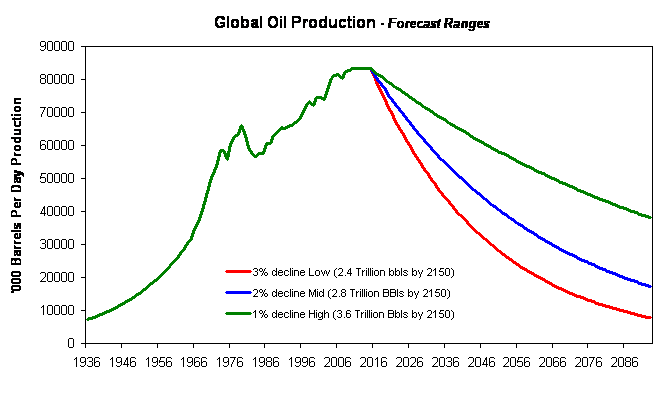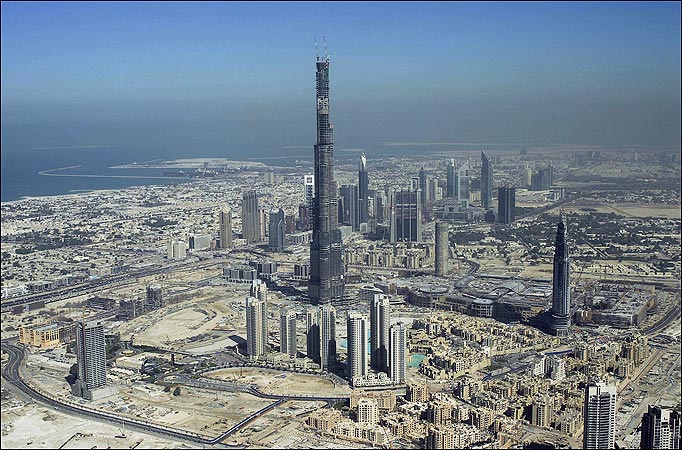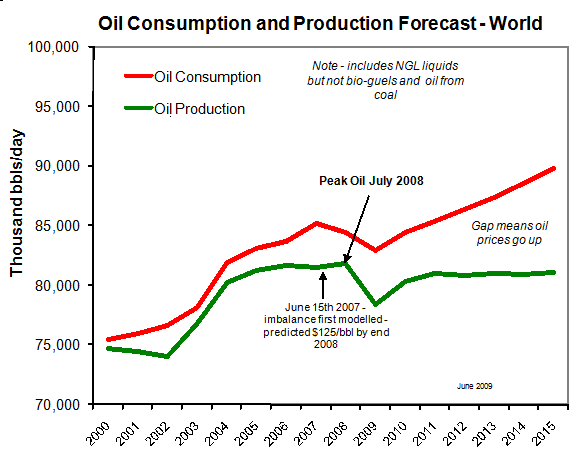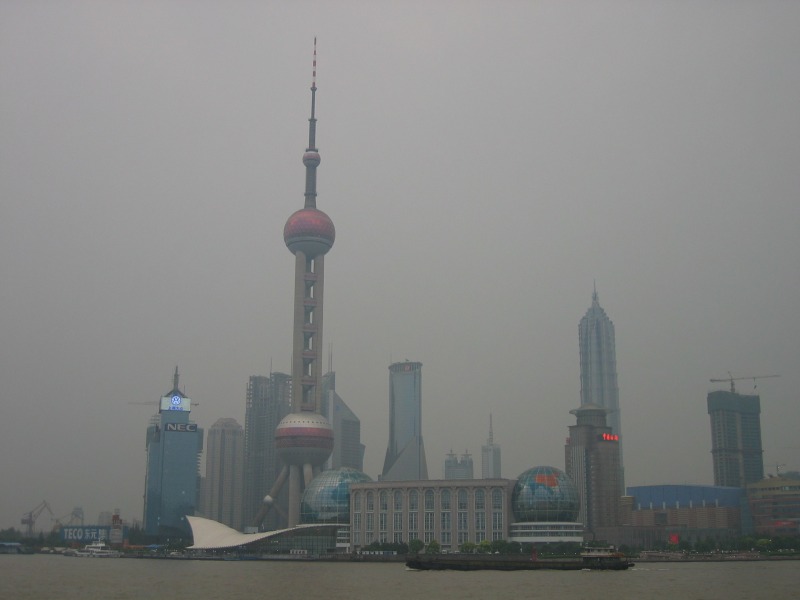330: Obama Administration - trigger for oil production decline - impact for property investors
06-18-2010

Peak Oil is Behind Us: As our website visitors are aware, we have been warning of the affects of Peak Oil for the last few years. We believe Peak Oil was 2005 for crude oil and July 2008 for all liquids. We have stated that its possible there could be a small rise – possibly an additional 1 million barrels a day above the previous July 2008 peak, but this would just be an undulation on a Peak Oil plateau, before a decline sets in.


Obama Triggers Production Crisis: We’ve now become far more pessimistic since the Gulf of Mexico spill. Obama has been severely critical of the oil industry and we now expect this to precipitate an oil production decline in the USA this year which will spill over to a global decline by 2011. Just when the USA and the world most desperately needs further oil supplies to keep in the plateau, the shortage of supply from the ban on drilling in the USA will be most pressingly felt. This is the unintended consequence of Obama's destruction of energy businesses in the USA and lack of clear actions and initiatives to help oil conservation and alternative energy in the USA. Plus the failure to change Detroit automotive businesses to more energy efficient models, also electric powered models - nothing has changes in Detroit and it's a shame since gas prices will skyrocket later this year.
Peak Oil - PropertyInvesting.net team - outlook for global oil production - flat until 2015 then decline scenarios (any gap between global GDP growth and oil production will need to be taken by improved oil efficiency and/or switch to national gas)

USA did well until 2009: The previous Bush administration spent 10 years quietly encouraging the oil business in all parts of the USA culminating in firstly a plateau of both oil and gas production in 2008, then a rise in 2009 (remember it takes many years from discovery to production). Despite his oil background, Bush warned 5 years ago about the USA's addition to oil, encouraging a switch to gas that lead to massive new gas reserves and production. The USA’s oil production increased by a massive 7% last year – the biggest in any country in the world – after new discoveries were made during 2000-2007. But now this is all ending. Oil production will continue its onward decline. Increased environmental and political pressure on onshore gas producers will also start to stifle gas production growth. The ban on drilling is already having an effect - it cannot be ignored - it will takes years to recover.

Massive new demand: Meanwhile India, China and other developing nations will keep growing their oil demand by at least 3% to 6% a year. If their GDPs are increasing by 8% and 11% respectively, this is a conservative increase in oil demand. It will lead to oil shortages in 2011 and oil prices rising sharply. Yes, 2.5 billion people in both countries all wanting to drive cars, buy electric appliances, use roads, rail and buy consumer goods and go shopping and on holidays to far flung places. Just like the Americans wanted to do in the 1950s. Since 1990, oil demand in India a nd China has increase from 3.5 million barrels a day to 14 million barrels as day - and there is no end in sight - if anything demand is accelerating. There is in direct competition for depleting resources with the USA - it's scary. If prices drop, China imports more and fills tanks, caverns and new storage sites. This trend is so worrying that the US military wrote an article in April 2010 warning the US administration that global oil production would drop from 2013 onwards - yes, the military telling the government about Peak Oil. Surely it should be the other way around? Clearly the current administration are not listening, don't have a clue or know but are not telling anyone. Probably the latter - but its not a good news story, so don't expect to hear it. At his key speech mid June, Obama and his administration missed a golden opportunity to warn people of a US and global oil decline and rising oil prices - and the need to switch urgently to other sources, but he missed it badly. He was focussing on other things - playing a blame game that will not help save jobs, prospects or rising prices, debts and economic hardship. May be it's too much to expect to be warned of anything that is not good news. The is probably more political mileage in demonstrating skills in crisis management.
nd China has increase from 3.5 million barrels a day to 14 million barrels as day - and there is no end in sight - if anything demand is accelerating. There is in direct competition for depleting resources with the USA - it's scary. If prices drop, China imports more and fills tanks, caverns and new storage sites. This trend is so worrying that the US military wrote an article in April 2010 warning the US administration that global oil production would drop from 2013 onwards - yes, the military telling the government about Peak Oil. Surely it should be the other way around? Clearly the current administration are not listening, don't have a clue or know but are not telling anyone. Probably the latter - but its not a good news story, so don't expect to hear it. At his key speech mid June, Obama and his administration missed a golden opportunity to warn people of a US and global oil decline and rising oil prices - and the need to switch urgently to other sources, but he missed it badly. He was focussing on other things - playing a blame game that will not help save jobs, prospects or rising prices, debts and economic hardship. May be it's too much to expect to be warned of anything that is not good news. The is probably more political mileage in demonstrating skills in crisis management.
Trigger Obama Anti-Business: The trigger for the Peak Oil shortages will be Obama’s actions in May 2010 – when he banned drilling and spooked the whole global energy business by an almost single handed destruction of the largest private oil company in the world, with a 100 year track record and previously rock robust balance sheet. A company that employs 40,000 people directly in the USA, in which 40% of shares are owned in the USA and whose energy portfolio is 40% in the USA. A company that supplies the US military and government with more oil than any other company in the world. Wow. First it was the banks and now it is oil. He switched off a whole energy sector. 1,000,000 workers.


Money Wasted: The Iraq war has cost $3 Trillion. Meanwhile the USA imports $0.4 Trillion of oil a year. However, research and development on energy (and energy security) is a meagre $5 Billion a year. Compare this to military research and development of $50 Billion a year. Just think of the benefits that can be had by investing that type of money into something productive like energy efficiency technology.
Import or Export is Key: The reason why we describe these actions is that Peak Oil will have profound implications for economies and property investment. All major oil important nations will suffer. All major oil exporting nations will likely benefit as long as they can maintain political stability and security. As oil exporters surpluses rise, oil importers deficits will rise. It will tip $1.5 Trillion of money from western oil importing nations to middle eastern and Russian oil exporting nations each year. That's a lot of money.
Next Crisis: Oil prices will sky-rocket and major oil importing nations will suffer recessions because of it. It always happens. Whenever there is and has been a major run up in oil prices, this has lead to a recession. Examples are 1972, 1981, 1991 and 2008. The next recession is likely to be a few years away when the oil price sky-rockets again – it could be as early as 2011. As major developed nations tip into recession, developed nations will slow down – but their lower cost base and rising and young populations will likely protect them from recession better than the more inefficient developed nations.
because of it. It always happens. Whenever there is and has been a major run up in oil prices, this has lead to a recession. Examples are 1972, 1981, 1991 and 2008. The next recession is likely to be a few years away when the oil price sky-rockets again – it could be as early as 2011. As major developed nations tip into recession, developed nations will slow down – but their lower cost base and rising and young populations will likely protect them from recession better than the more inefficient developed nations.
Avoid Importers: The countries to avoid are all major developed oil importing nations that do not have strong mining, knowledge based industries, financial service and/or manufacturing. If the population is declining and aging, even worse. If the country has inefficient agriculture – even worse. If the country has high social spending, high health costs, high pensions costs and potential water shortages, even worse. If the country is exposed to medium to longer distance airline travel and tourism, even worse.
In summary, there are a few countries that stack-up very badly against Peak Oil – to name a few:
Portugal, Italy, Greece and Spain (PIGS)
Lovely places to live, lovely people but not famous for any industrial leadership – particularly Greece and Portugal.


Massive Imports and Debt: They all import massive quantities of oil, gas, coal, metals and some even import electricity. They all have aging populations, large public sectors, high social spending and hence massive deficits. Frankly, even if they cut back the deficits, as soon as oil prices rise further, they will have to cut deeper to survive default. The writing is on the wall for these countries – they are taking massive risk because if oil prices double, they will not be able to afford to pay their debts. Its probably too late for them – they are in the "lap of the gods" (OPEC) - they are keeping their fingers crossed that oil prices don’t double. As soon as they do double, their economies will implode – their deficits will rise from 8-12% to 12-16% - too much. Even if they reduce their deficits by 5%, if oil prices double – they will immediately loose this benefit. If oil prices rise, gas, electricity, water, coal and metals prices will also likely sky-rocket as inflation kicks in – so these countries will have to pay bloated commodities import bills that will further deteriorate their balance sheets. We hope we have made it clear how precarious these countries are – and of course, our advice is, don’t invest in property in these countries. You might find because the Euro bank rates remain low and European fiscal stimuli kick-in in 2010 the property prices in the PIGS countries start to stabilise. But we believe it will be temporary. Once the deficits get out of hand again off the back of higher commodities prices in 2011, these countries will dip back into recession, they may default or be forced rapidly to leave the Euro currency. Then any property you have purchased will not only have crashed in price, but the currency will have crashed as well. To put it into a broader perspective, all Euro countries import practically ALL their oil. They import most of their gas (except Holland). And they even import most of their coal. So the Euro currency is not backed by reserves of metals, coal, gas or oil. As the Euroland prints money – it will be mirage money based on little apart from French and German manufacturing prowess.



End of Euro Chain of Events: The European experiment is likely to end after the effects of Peak Oil hit – this will be the underlying trigger:
-
Gulf of Mexico spill April 2010
-
Obama’s ban on drilling and discouragement to energy companies May 2010
-
Global oil supply drop end 2010
-
Global oil demand increase (China, India and developing nations) end 2010
-
Oil prices skyrocket (along with other commodities) early 2011
-
European deficit crisis reoccurrence mid 2011
-
Greece, Portugal default end 2011 to early 2012
-
Break-up of European currency end 2011 to early 2012

Easy Oil Gone:
All the "easy oil" to produce is gone. It is become ever increasingly complex, expensive, risky and technologically challenging to extract oil. Environmental constraints in many parts of the world mean many potential reserves are out of reach. The Gulf of Mexico spill will tighten things further, especially in the USA. 90% of oil reserves are in the state oil company hands. USA has 5% of the world's population, but uses 25% of the world’s oil. Meanwhile USA has only 2% of the world's oil reserves but produces 15% of the total production – that’s scary. And now Obama's made it even more scary for oil companies because they have learnt they can go bankrupt or close to it at any time from political pressure – one mistake and the company keels over and sinks - uncontrolled slide.Who would invest in energy projects in the USA now?
Don’t expect massive new investment in the oil and gas sector of the USA. Rigs have already been released and they will not return. The investment climate is very uncertain and risky. Other countries will have lower risk opportunities. If you are thinking this is good news for alternative renewable energy sources – think again. Who in the right mind would risk large amounts of capital when a mistake in the energy sector could lead to the same outcome. A wind turbine falling over. A nuclear plant having a leak. A coal burning power plant exploding or leaking dirty water into a river. A solar plant catching fire. Higher taxes. Environmental penalties. Unlimited damaged. They all have risks and what Obama has proved is that business risk and cost of capital have sky-rocketted in the USA – which will lead to less energy, higher prices and loss of jobs. It will be an awful trigger point that we will look back on and regret in future years. How it led to reduced oil supply just when it was most needed in the USA – as India and China's demand exploded, Saudi’s oil production started to level off and other countries started their oil decline. It's rather grim. But something as a property investor you definitely need to consider. Other industries like chemical, auto, manufacturing, consumer, retail, airline and finance will be looking over their shoulder - one mistake from deep within the organisation - and the CEO could be in the dock and company lost. A chemical leak into a river. Some foot product gone wrong - risks have sky-rocketted for US business. This will lead to jobs losses as investment levels drop.Safe Property: The safest property investment areas are now Canada, Australia and Norway (see the Peak Oil susceptibility index below). That’s it really. They are democratic, secure, safe, well run large countries with small expanding populations that export oil and gas, have large land resources, have mining and well educated workforce that are motivated. They will prosper as other countries like Spain, Greece, Portugal and Italy decline – for exactly the same reasons (they import, have large aging populations, lack water, no mining, no oil/gas/coal). Its pretty simple really. Avoid any country that does not have oil, gas, coal, metals – and also does not have prowess in manufacturing or financial services.
 UK only average: The UK ranks average in all these key attributes – not the worst but not the best. London ranks highest region in the country – the least energy intense part of the UK that uses electric transport the most and has the highest GDP per oil barrel utilised. Tax on businesses and private individuals is too high and increasing, so this will set the UK back, particularly of flat rate capital gains tax rises above 18% on 22 June (no tapered relief).
UK only average: The UK ranks average in all these key attributes – not the worst but not the best. London ranks highest region in the country – the least energy intense part of the UK that uses electric transport the most and has the highest GDP per oil barrel utilised. Tax on businesses and private individuals is too high and increasing, so this will set the UK back, particularly of flat rate capital gains tax rises above 18% on 22 June (no tapered relief).
Regrettable Gloom: We hope this has given you a feeling of the shape of events to come. It’s a rather gloomy prognosis because it implies a double dip recession in developed oil importing nations – from early 2011 onwards - caused by oil prices skyrocketting again – triggered by declines in US oil production. And the onset of Peak Oil production shortages. So be careful – and if you are truly worried, best consider monetising or shifting your portfolio. Expect taxes to rise in the USA next year, oil production to decline, deficits to worsen and unemployment to rise - borrowing will rise and the dollar will drop. Inflation will also rise and base rates with it. Not a good combination regrettably for real estate investment, particularly in manufacturing dominated areas like Detroit and Philadelphia. Texas and Louisiana will be badly affected by the slowdown in energy activity and rising oil prices will act as a further negative trigger like a higher taxes. And healthcare costs will continue to rise well above the $6500 per person per year at present, as social spending increases further. It will take years of cost cutting by another administration to repair this damage, and we would not expect any improvement for at least 4-5 years in the USA. Higher taxes, higher social spending, low business activity, lower oil production and higher oil prices will be a very worrying combination for 2011.
If you have any comments, please contact us on enquiries@propertyinvesting.net .
Peak Oil (all liquids) was July 2008 - we are now on a bump plateau - it is unlikely production will ever rise significantly henceforth

Appendix 1: PropertInvesting.net's economic projection scenarios for 2011-2012.
What this chart shows is that each Japanese person consumes 7.81 tons of imported oil equivalent per year, whilst each Kuwaiti person exports 39.73 tons of oil equivalent per year. Spain and Italy, who have uncompetitive global manufacturing, import about 2.8 tons per person per year - a huge quantity. For countries forecast to boom in Peak Oil times, focus on sable low risk countries in green - best examples are Norway, Australia and Canada.
| Peak Oil Susceptibility Index | ||
| - impact of high hydrocarbon prices - | ||
| Country | Hydrocarbons Production Surplus Tons Oil Equi/ Person/ Year | |
| Kuwait | 39.73 | |
| Brunei | 39.63 | |
| Norway | 38.64 | |
| UAE | 24.76 | |
| Turkmenistan | 20.91 | |
| Saudi Arabia | 17.95 | |
| Libya | 17.79 | |
| Kazakhstan | 15.66 | |
| Oman | 10.86 | |
| Australia | 7.35 | |
| Trinidad & Tob | 6.98 | |
| Venezuela | 5.05 | |
| Bahrain | 4.98 | |
| Azerbaijan | 4.96 | |
| Qatar | 4.55 | |
| Algeria | 4.18 | |
| Canada | 4.11 | |
| Russia | 3.77 | |
| Iraq | 3.67 | |
| Angola | 3.22 | |
| Iran | 1.92 | |
| Colombia | 1.40 | |
| Syria | 1.25 | |
| Vietnam | 1.17 | |
| Nigeria | 1.07 | |
| Malaysia | 0.99 | |
| Ecuador | 0.97 | |
| Mexico | 0.80 | |
| South Africa | 0.69 | |
| Equatorial Guinea | 0.68 | |
| Bolivia | 0.56 | |
| Indonesia | 0.55 | |
| Denmark | 0.46 | |
| Argentina | 0.46 | |
| Yemen | 0.42 | |
| Egypt | 0.24 | |
| Sudan | 0.18 | |
| Rep. of Congo | 0.15 | |
| Myanmar | 0.13 | |
| Turkey | -0.01 | |
| Bangladesh | -0.03 | |
| India | -0.11 | |
| Brazil | -0.12 | |
| China | -0.13 | |
| Pakistan | -0.14 | |
| Romania | -0.29 | |
| New Zealand | -0.57 | |
| Poland | -0.60 | |
| Czech Republic | -0.60 | |
| Thailand | -0.71 | |
| United Kingdom | -0.80 | |
| Greece | -0.98 | |
| France | -1.15 | |
| Ukraine | -1.58 | |
| Netherlands | -2.24 | |
| USA | -2.39 | |
| Germany | -2.67 | |
| Italy | -2.71 | |
| Spain | -2.87 | |
| South Korea | -3.95 | |
| Japan | -7.81 | |
| Legend | ||
| Positive impact | Economic Benefit | |
| Neutral impact | ||
| Negative impact | ||
| Strongly -ve impact | ||
| V.worrying impact | Economic crisis | |
China Traffic Jam - Boom in Oil Consumption

Oil Tanker Japan
Oil Crisis 1973







